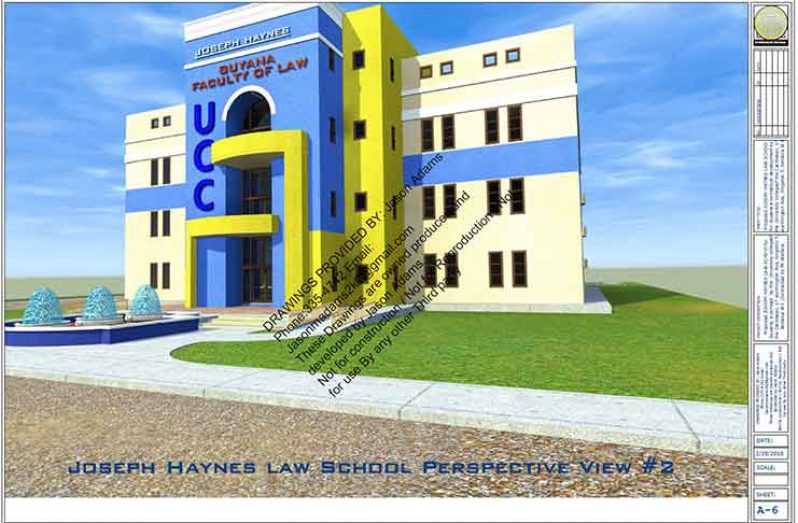GUYANA is in the process of submitting its shareholders agreement, feasibility study and revised business plan to the Council for Legal Education (CLE).
Attorney General and Minister of Legal Affairs, Basil Williams, SC, told reporters on the sidelines of a money-laundering, risk-assessment seminar Wednesday that following a meeting recently with the Jamaican joint venture partners– the Law School of the Americas (LCA) and the University College of the Caribbean (UCC) — it was decided that all relevant documentation will be submitted to the CLE for review.
“We have reached agreement on the shareholders’ agreement and feasibility study and business plan, so those documents will be sent to the CLE for their appraisal,” said Williams. He told reporters that with Guyana having its own law school, the pressure of finding in excess of $3M for tuition, housing, food and transportation by Guyanese students would be significantly minimised.
The attorney general assured that fees will be much lower. “Our people are paying nearly $3M over there and they still have to travel, eat…so anything would be better,” he stated. Annually, approximately 25 Guyanese law students are accepted and admitted to the Hugh Wooding Law School (HWLS), in Trinidad to complete their Legal Education Certificate (LEC)–a prerequisite to practise law in the Region. This figure pales in comparison to the hundreds of students who graduate each year from Trinidad and Jamaica.
Additionally, Williams said efforts are being made to have significant progress made by September 2019. He said while there are hopes for the school to begin operations then, “we want our campus to be built.” Some 10 acres of land within the compound of the University of Guyana’s (UG) Turkeyen Campus has been allocated for the construction of the US$6 M law school. The attorney general made it clear that the Government of Guyana along with its joint venture partners is not mindful of rental any premises before “meaningful construction has begun.”
Williams said that the law school which is to be named after outstanding jurist Joseph Oscar Fitzclarence (JOF) Haynes Law School will be under the aegis of the CLE, though governance of the school will reside with the partners.
The JOF Haynes Law School is being established through a Public-Private Partnership between the Government of Guyana, the Law School of the Americas (LCA) and the University College of the Caribbean (UCC) and will add to the existing options available to holders of a Bachelor of Laws (LLB), and who intend to pursue their Legal Education Certificate (LEC).
The project comes after some two decades of lobbying for an alternative to the Norman Manley Law School in Jamaica, the Hugh Wooding Law School in Trinidad and Tobago and the Eugene Dupuch Law School in The Bahamas. Back in April, the Guyana Chronicle reported that the Improved Access to Justice in the Caribbean (IMPACT Justice) in its final report following a survey of legal education in CARICOM member states, dated February 2018, recommended among other things that law schools be established in Guyana, and two other Caribbean states.
“New law schools should be set up as soon as possible as part of Utech in Jamaica, UG in Guyana and possibly in Antigua and Barbuda, principally, but not exclusively, for the non- UWI LL.B. degree graduates whose degrees are deemed by the Council to meet the equivalency standard of the UWI LL.B. degree,” the report stated.
Additionally, the recommendations which stem from a survey conducted in Antigua and Barbuda, The Bahamas, Barbados, Belize, Dominica, Grenada, Guyana, Jamaica, Montserrat, St. Kitts and Nevis, St. Lucia, St. Vincent and the Grenadines and Trinidad and Tobago, said the opening of additional law schools under the aegis of the Council for Legal Education (CLE) as is presently constituted, will not solve the problems facing law students across the Region.
According to the document, the establishment of additional regional law schools in the three jurisdictions under the CLE would provide an early mechanism for addressing the unsatisfied demand for access to practise law by the many persons who are holders of non-University of the West Indies (UWI) LLB degrees. “It would also ensure that region-wide, the highest standards of legal education are maintained,” the report said.
“It is therefore recommended that as a matter of urgency, discussions be held with the government of Guyana with a view to establishing a law school that would be regulated and licensed by the Council in its new proposed role,” the report stated.
Additionally, the document states that the proposal to establish a law school in Guyana outside of the Treaty arrangements “only serves to underscore the pressing need for the Council to rethink its role and function, particularly given that other jurisdictions have also signaled their intention to set up law schools outside of the legal framework of the Council if the issue of access to practise law in the region is not addressed in a comprehensive and meaningful and timely manner.”




.png)









